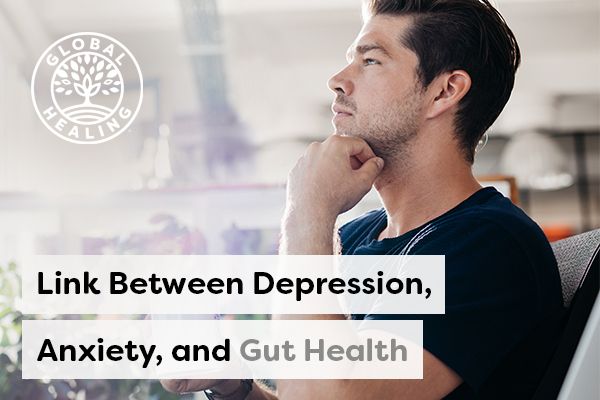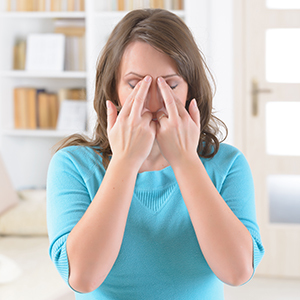
Did you know your gut health may affect your mood and behavior? The belief that gut health is connected to mental well-being dates back more than a hundred years. In the early 1900’s, scientists and clinicians emphasized the relationship between gastrointestinal health and mental health. By 1930, opinions reversed and it was thought that mental health disorders were an influencing factor in gastrointestinal disorders.[1]
The interest in gut health has never been stronger and the exploration into the gut microbiota has revealed a close relation between behavioral issues, mood, and bacteria imbalance. There are a number of factors that influence the condition of the gut microbiota and gut environment, diet is a major one.[2] Immune system health is also closely associated.[3]
How Your Gut Is Connected to Your Brain
The gut is connected to the brain via the vagus nerve, the enteric nervous system, and the gut-brain axis. The vagus nerve extends from the brain stem down into the neck, thorax, and abdomen. The nerve exits the brain stem through rootlets in the medulla that are caudal to the rootlets for the ninth cranial nerve.[4] The vagus nerve supplies motor parasympathetic fibers to all organs except adrenal glands, all the way from the neck down to the second segment of the transverse colon. It helps regulate heart rate, speech, sweating, and various gastrointestinal functions.
The enteric nervous system connects with the central nervous system. It contains 200-600 million neurons.[5] Local and centrally projecting sensory neurons in the gut wall monitor mechanical conditions in the gut wall. Local circuit neurons, on the other hand, integrate this information. This enables motor neurons to influence the activity of the smooth muscles in the gut wall and glandular secretions such as digestive enzymes, mucus, stomach acid, and bile.[6]
The enteric nervous system has been referred to as a “second brain” because of its ability to operate autonomously and communicate with the central nervous system through the parasympathetic (i.e., via the vagus nerve) and sympathetic nervous systems.
Finally, the gut-brain axis consists of bidirectional communication between the central and the enteric nervous system, linking emotional and cognitive centers of the brain with peripheral intestinal functions.[7] There is strong evidence from animal studies that gut microorganisms can activate the vagus nerve and play a critical role in mediating effects on the brain and behavior.[8]
The Role of Bacteria in Depression and Anxiety
Research has shown the gut microbiota influences brain chemistry and behavior.[9] For example, people who suffer from irritable bowel syndrome (IBS) and the associated cramping, abdominal pain, bloating, gas, diarrhea, and constipation, commonly suffer from depression and anxiety as well.
The interaction between bacteria and depression and anxiety goes both ways. For example, researchers concluded that daily stress might increase vulnerability to disease, ranging from depression to irritable bowel syndrome.[10]
Gut microbiota influences serotonin and dopamine production. In fact, more than 90 percent of the body’s serotonin is found in the gut. Serotonin is a key regulator of gastrointestinal motility.[11] Serotonin is also one of the “feel-good” neurotransmitters and contributes to feelings of well-being and happiness. In fact, the enteric nervous system makes use of more than thirty neurotransmitters, including serotonin, dopamine, and acetylcholine. Even probiotics may have a therapeutic effect on anxiety and depression symptoms.[12]
How to Aid or Restore Your Gut Flora
Following a healthy diet is one way to encourage a healthy gastrointestinal tract. Base your diet on fruits and vegetables. Add fermented foods, such as kefir and sauerkraut, to your diet for a good, natural source of probiotics.
If you don't consume probiotic foods, consider taking a high-strain probiotic supplement such as Global Healing's Ultimate Probiotic, which also contains prebiotics, to promote a healthy gut environment.
References (12)
- Alison C Bested, Alan C Logan, Eva M Selhub. Intestinal microbiota, probiotics and mental health: from Metchinikoff to modern advances: Part II – contemporary contextual. Gut Pathog. 2013; 5.
- Dash S, Clarke G, Berk M, Jacka FN. The gut microbiome and diet in psychiatry: focus on depression. Current Opinion in Psychiatry. 2015 Jan: 28(1):1-6.
- Yasmine Belkaid, Timothy Hand. Role of the Microbiota in Immunity and Inflammation. Cell. 2014 Mar 27.
- LOYOLA UNIVERSITY CHICAGO HEALTH SCIENCES DIVISION. Stritch School of Medicine. The Vagus Nerve.
- Furness JB, Callaghan BP, Rivera LR, Cho HJ. The enteric nervous system and gastrointestinal innervation: integrated local and central control. Advances in Experimental Medicine and Biology. 2014;817:39-71.
- Purves D, Augustine GJ, Fitzpatrick D, et al. The Enteric Nervous System. Neuroscience. 2nd Edition. Sinauer Associates; 2001.
- Marilia Carabotti, Annunziata Scirocco, Maria Antonietta Maselli and Carola Severi. The gut-brain axis: interactions between enteric microbiota, central and enteric nervous systems. Ann Gastroenerology. 2015 Apr-Jun.
- Forsythe P, Bienenstock J, Kunze WA. Vagal pathways for microbiome-brain-gut-axis communication. Advances in Experimental Medicine and Biology. 2014.
- Dinan TG, Cryan JF. Melancholic microbes: a link between gut microbiota and depression? Neurogastroenterology and Motility. 2013 September.
- O’Mahony SM, Marchesi JR, Scully P, Codling C, Ceolho AM, Quigley EM, Cryan JF, Dinan TG. Early life stress alters behavior, immunity and microbiota in rats: implications for irritable bowel syndrome and psychiatric illness. Biological Psychiatry. 2009 Feb.
- Reigstad CS, Salmonson CE, Rainey JF 3rd, Szurszewski JH, Linden DR, Sonnenburg JL, Farrugia G, Kashyap PC. Gut microbes promote colonic serotonin production through an effect of short-chain fatty acids on enterochromaffin cells. FASEB J. 2015 Apr.
- Slyepchenko A, Carvalho AF, Cha DS, Kasper S, McIntyre RS. Gut emotions – mechanisms of action of probiotics as novel therapeutic targets for depression and anxiety disorders. CNS & Neurological Disorders Drug Targets. 2014:13.
†Results may vary. Information and statements made are for education purposes and are not intended to replace the advice of your doctor. If you have a severe medical condition or health concern, see your physician.







